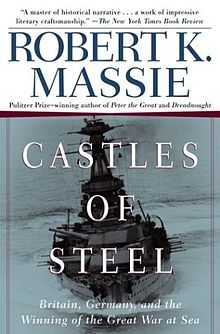Castles of Steel
 | |
| Author | Robert K. Massie |
|---|---|
| Country | England |
| Language | English |
| Genre | Non-fiction |
| Publisher | Ballantine Books |
Publication date | 2004 |
| Media type | Print (Paperback) |
| Pages | 880 pp |
| ISBN | 0-345-40878-0 |
| OCLC | 57134223 |
| Preceded by | Dreadnought: Britain, Germany, and the Coming of the Great War |
Castles of Steel: Britain, Germany, and the Winning of the Great War at Sea is a work of non-fiction by Pulitzer Prize-winner Robert K. Massie. It details the naval actions of the First World War with an emphasis on those of the United Kingdom and Imperial Germany. This book continues the examination of the naval arms race between these two powers in Massie's tome Dreadnought: Britain, Germany, and the coming of the Great War. The term "castles of steel" was coined by the British First Lord of the Admiralty Winston Churchill in reference to the large number of the Royal Navy's battleships he saw in review at Spithead in 1914.[1]
Summary
The book begins in the lead-up to the declaration of hostilities between Germany and Britain, whereas Massie's previous work ended with the beginning of the war. All the significant naval strategies and battles of World War I are covered, including the Battle of Coronel, where a German squadron led by Admiral Maximilian von Spee destroyed a weaker British cruiser squadron under the command of Admiral Sir Christopher Cradock; the ensuing Battle of the Falkland Islands where von Spee's force was annihilated by a superior British squadron; the Battle of Dogger Bank (1915); Naval operations in the Dardanelles Campaign; and a detailed multichapter narrative of the Battle of Jutland and its aftermath.
Other chapters describe German submarine warfare and events triggering America's entry into the war. There are also chapters dedicated to central personalities such as British Admirals John Jellicoe and David Beatty and the German Admirals Franz von Hipper and Reinhard Scheer. The book ends with an account of the scuttling of the German High Seas Fleet in Scapa Flow.
A number of maps and photographs are included.
Footnotes
- ↑ Churchill. The World Crisis. pp. 212–213.
References
- Churchill, Winston Leonard Spencer (1923). The World Crisis. Volume I. London: Thomas Butterworth.
- Massie, Robert Kinloch (2003). Castles of Steel: Britain Germany, and the Winning of the Great War at Sea. New York: Ballantine Books. ISBN 0-345-40878-0.
External links
- Guardian.co.uk Review of Castles of Steel by historian Ben Pimlott